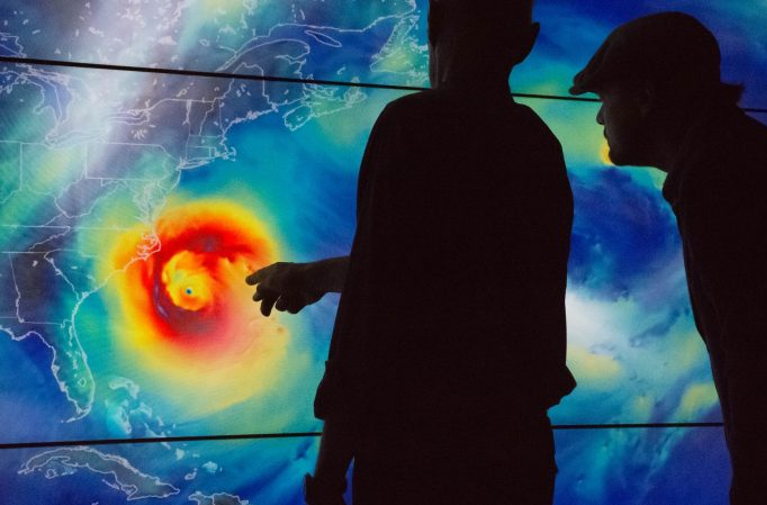Last month, US oil giant ExxonMobil was invited by the European Parliament to testify publicly about their history of climate change denial. But instead of responding transparently, they tried behind the scenes to discredit the peer-reviewed research conducted by Harvard University researchers, writes Geoffrey Supran.
ExxonMobil’s attack on my peer-reviewed research in the European Parliament is the tip of the iceberg of its assault on democratic decision-making and a reminder that the tiger hasn’t changed its stripes. As MEPs meet this Thursday to decide whether to ban ExxonMobil from lobbying, they must bear this in mind: Big Oil is the new Big Tobacco.
On 21 March, the European Parliament did something extraordinary. For the first time anywhere in the world, lawmakers convened expressly to hear expert testimony about the history and consequences of climate change denial by the fossil fuel industry.
Less than a week after millions of school children marched for action on climate change, MEPs were taking a first step towards holding accountable those who have done the most to prevent it.
I was honoured to be among the expert witnesses invited to testify at the hearing. I explained to MEPs how internal memos from the fossil fuel industry show that it has known about the potential dangers of global warming caused by its products for 60 years.
I described how, instead of warning the world or taking action, fossil fuel companies took the low road, spending the past 30 years – my entire life – sabotaging science, slandering scientists, and undermining policy to protect profits. Their tactics came straight out of Big Tobacco’s playbook. “Unfortunately,” I concluded, “they have largely succeeded.”
Exhibit A of this history of denial and delay is ExxonMobil. My testimony therefore centred around a peer-reviewed analysis of the company’s 40-year history of climate change communications, which Harvard Professor Naomi Oreskes and I co-authored in 2017. Our central finding: ExxonMobil knowingly misled the public about climate change by contributing quietly to the science yet loudly to raising doubts about it.
Given this track record, ExxonMobil’s response to my testimony was predictable and ironic. During the hearing I learned that although ExxonMobil had been invited to attend and to respond transparently to the historical evidence, they had refused, choosing instead to try to discredit me and Naomi – and thus influence MEPs – behind the scenes.
In a now-leaked letter sent to Parliamentary committees the day before the hearing, ExxonMobil alleged that our research is “inaccurate” and contains “fundamental errors.” One MEP, Mr Laurenţiu Rebega, then recited ExxonMobil’s slanders at me during the hearing.
ExxonMobil’s claims are untrue. As Naomi and I responded in a letter to MEPs last week, which we are making public here, “we fully stand by our conclusion that Exxon, Mobil, and ExxonMobil Corp. have all variously misled the public about climate science and its implications.”
Moreover, our results do not stand in isolation – they are corroborated by numerous independent lines of scholarly and journalistic investigation. In fact, we also point out, ExxonMobil’s behaviour surrounding the hearing epitomizes the very behaviour the hearing was convened to address.
First, rather than speaking publicly and on-the-record, ExxonMobil operates in the shadows, misinforming decision makers in a way that offers little or no opportunity for scientists to correct the record.
This type of behaviour by corporate interests and their parliamentary allies to undermine expert witness testimony – and to intimidate potential future expert witnesses – subverts the very purpose of a hearing and is an affront to EU Parliament and democracy.
It demonstrates that although ExxonMobil now claim to support climate action, they continue to misrepresent scientific work in order to protect profits and protect themselves from liability or responsibility.
Second, the company’s letter calls for a “neutral review of the facts,” yet makes its case by citing a non-peer-reviewed report commissioned and paid for by ExxonMobil. These tactics are precisely the sort of expert-for-hire doubt-mongering and character assassination that I summarised in my testimony.
Instead of subjecting their criticisms to the objective, independent scrutiny of academic peer-review, as we (and all scientists) do, ExxonMobil paid someone to write something and stick it on the Internet, in order to falsely claim that our work has been refuted.
They even claim that their expert-for-hire “developed” the content analysis method our study employs, which is also false: as the expert-for-hire’s own report acknowledges, content analysis “dat[es] to the early 20th century.”
ExxonMobil is now misleading politicians and the public about its history of misleading the public. This includes the straw man argument that they have never hidden or suppressed climate science research, even though no one is accusing them of doing so. What we do say – and show – is that they misled the public. On this point the company remains silent.
It has become a familiar pattern. Scientists publish science, ExxonMobil responds with spin.
ExxonMobil claims to accept climate science, but they continue to fund politicians and third-party organisations that deny it. They claim to support carbon pricing, but they overwhelmingly finance lawmakers and lobbyists who oppose it.
They claim to support clean energy and the Paris climate agreement, but they continue to double down on a business model incompatible with the science of stopping climate change.
This is an industry gone rogue, but it has not gone unnoticed: Immediately following the hearing, a dozen MEPs called for the European Parliament to ban ExxonMobil from lobbying. As their peers convene this Thursday to decide whether to do so, they should think twice about who they are willing to take direction from. Because as I told them in my testimony: Big Oil is the new Big Tobacco.





